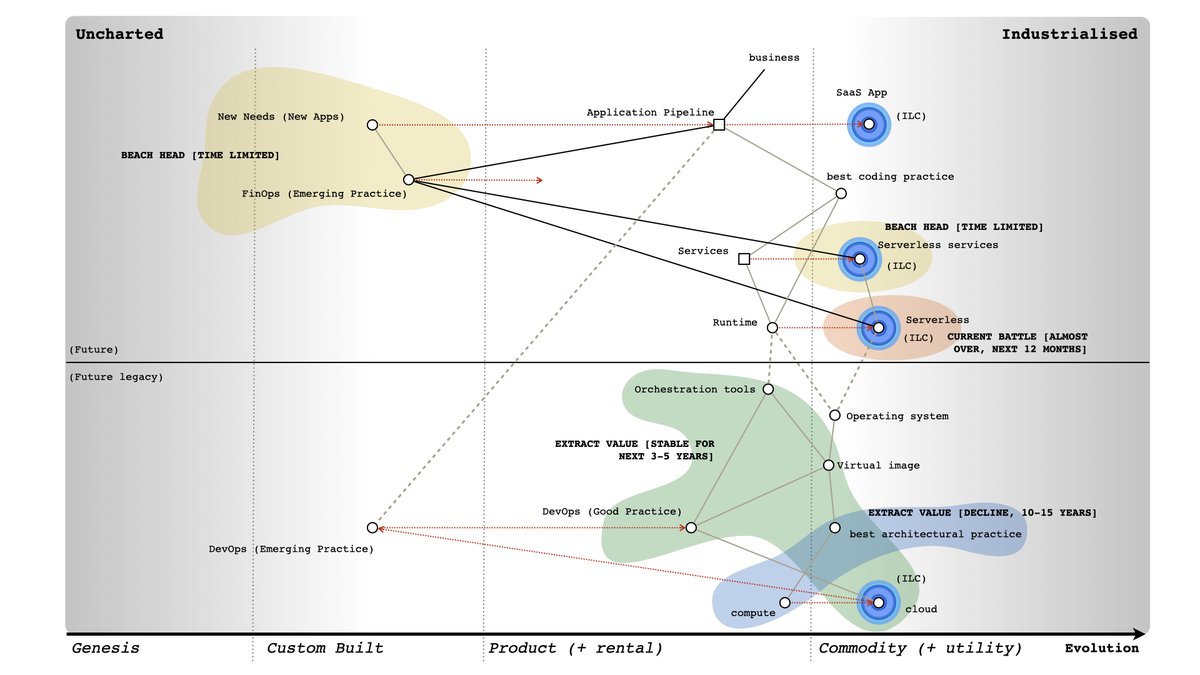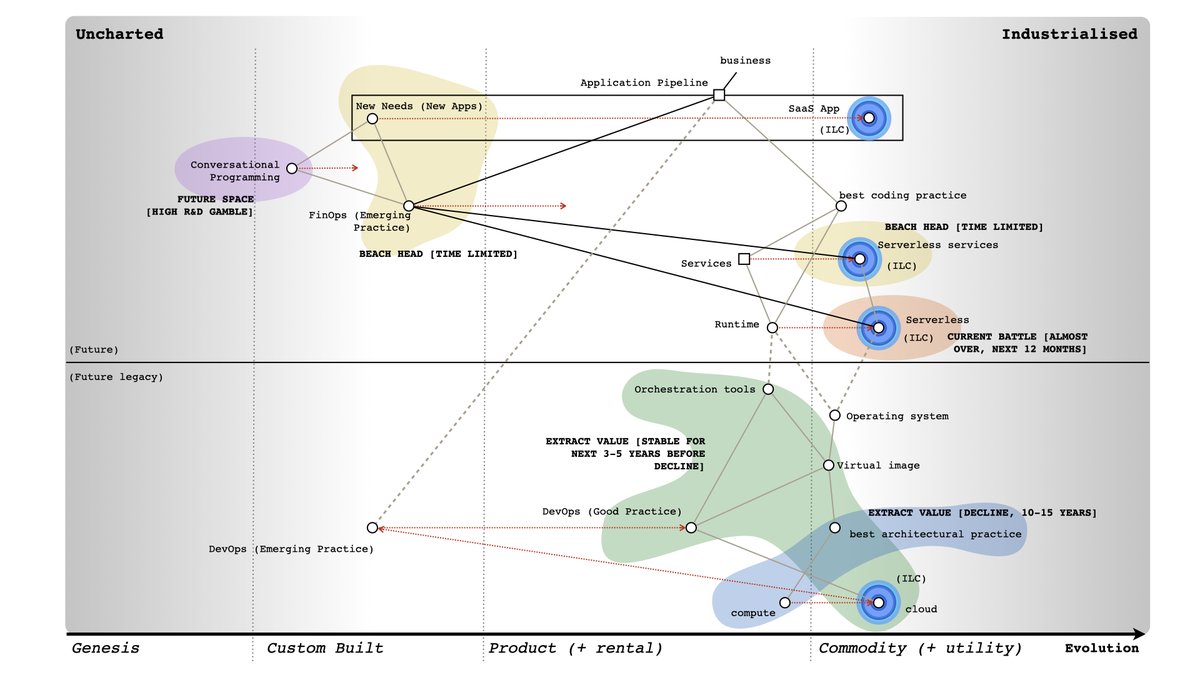X : Why are you so bullish on serverless?
Me : AWS creates the future by industrialising the past, it concentrates on shifting product to utility. Amazon then migrates onto this once convinced ... the first "huge" cloud transformation project was Amazon moving onto AWS ...
Me : AWS creates the future by industrialising the past, it concentrates on shifting product to utility. Amazon then migrates onto this once convinced ... the first "huge" cloud transformation project was Amazon moving onto AWS ...
... if you listened carefully at reInvent last year then you would have heard Jassy say that 50% of all new Amazon apps are built on serverless ... that& #39;s all the signal you need. AWS owns the underlying space, Amazon itself is building on top (including the practices) ...
... if you& #39;re fighting below the line i.e. in the containers / Kubernetes space then you& #39;re just building a future legacy ... it& #39;s the wrong space to own if your focus is the future but the right space to own if your focus is on short term extraction ...
... you need to think of this cloud space as a war, there& #39;s no point in winning a specific battle if the future position it gives you means you lose the war. I love Google but they have really played a poor game, out of their depth and I expect them out of cloud before 2025.
X : Why such a short time frame?
Me : I don& #39;t expect Google to displace Microsoft, let alone Amazon and as losses mount, I suspect we will be coming back to this. Google has form - https://www.crn.com/news/cloud/google-reportedly-set-ambitious-goal-and-possible-deadline-for-gcp">https://www.crn.com/news/clou...
Me : I don& #39;t expect Google to displace Microsoft, let alone Amazon and as losses mount, I suspect we will be coming back to this. Google has form - https://www.crn.com/news/cloud/google-reportedly-set-ambitious-goal-and-possible-deadline-for-gcp">https://www.crn.com/news/clou...
X : Where is conversational programming on that map?
Me : Sure, ftfy ... not relevant to the discussion at hand, that& #39;s more for future players.
Me : Sure, ftfy ... not relevant to the discussion at hand, that& #39;s more for future players.
X : Why is Google so poor in your view?
Me : They& #39;ve got great engineers but it& #39;s the strategic play that concerns me. I had a good old rant at Google Next when I was invited to speak back in 2017 ... they focused on the wrong area of the stack IMHO. Time will tell.
Me : They& #39;ve got great engineers but it& #39;s the strategic play that concerns me. I had a good old rant at Google Next when I was invited to speak back in 2017 ... they focused on the wrong area of the stack IMHO. Time will tell.
X : Kubernetes is huge.
Me : You can ride the growth for a time but the game has already shifted, you just end up painting yourself into a new corner of legacy. Fine for a grow quick, sell to someone who doesn& #39;t know startup.
Me : You can ride the growth for a time but the game has already shifted, you just end up painting yourself into a new corner of legacy. Fine for a grow quick, sell to someone who doesn& #39;t know startup.
X : What should my strategy be?
Me : Depends upon who you are, your capabilities, what you want to do and your timeframe. The map is just a map ... it doesn& #39;t tell you what your strategy is, that requires thought ...
Me : Depends upon who you are, your capabilities, what you want to do and your timeframe. The map is just a map ... it doesn& #39;t tell you what your strategy is, that requires thought ...
i.e. I could play an extract value game from legacy infrastructure or a grow quick and extract value from K8s or build a future position in serverless or focus on building SaaS apps or play a high risk gamble into conversational programming or a mix of the above ...
... never forget the long tail of value, the last punchcards systems in operation in the UK were in 2011.
The map isn& #39;t your strategy, however your strategy should be informed by the landscape (i.e. the map).
The map isn& #39;t your strategy, however your strategy should be informed by the landscape (i.e. the map).
X : What about horizons?
Me : Depends upon who you are and where you are on the map and those horizons will change as the map evolves.
Me : Depends upon who you are and where you are on the map and those horizons will change as the map evolves.
X : What about VMWare?
Me : They are very good at exploiting technology change to keep themselves going ... they& #39;ll make hay with K8s, same as they did OpenStack and they& #39;ll probably flog you a hybrid edge computing answer to everything ... as long as it has VMWare.
Me : They are very good at exploiting technology change to keep themselves going ... they& #39;ll make hay with K8s, same as they did OpenStack and they& #39;ll probably flog you a hybrid edge computing answer to everything ... as long as it has VMWare.
X : You seem to like VMWare?
Me : I respect a plucky fighter, they& #39;ve got a good few decades of life in them ... more than enough time for friends to retire.
Me : I respect a plucky fighter, they& #39;ve got a good few decades of life in them ... more than enough time for friends to retire.
X : Alibaba?
Me : Oh, that& #39;s the real battle coming our way ... Amazon vs Alibaba.
X : Google joining forces with Alibaba?
Me : That would make life interesting but I just don& #39;t see it. More likely MSFT and Alibaba, they& #39;ve got some real strategic wit about them these days.
Me : Oh, that& #39;s the real battle coming our way ... Amazon vs Alibaba.
X : Google joining forces with Alibaba?
Me : That would make life interesting but I just don& #39;t see it. More likely MSFT and Alibaba, they& #39;ve got some real strategic wit about them these days.
As it currently stands Alibaba and Amazon both have space arms, MSFT is partnering with SpaceX but is missing that component without them ... still, it& #39;s going to get interesting as Moore& #39;s law goes into space. Poor old 5G masts, still there& #39;ll be value in the market for a time.
X : Satellites are new!
Me : Cubesat. It& #39;s all about industrialisation of components and more importantly industrialisation of network topology. Even copper / fibre networks are custom to the physical landscape, less so with masts (broadcast) and satellites is a numbers game ...
Me : Cubesat. It& #39;s all about industrialisation of components and more importantly industrialisation of network topology. Even copper / fibre networks are custom to the physical landscape, less so with masts (broadcast) and satellites is a numbers game ...
... so whilst the concept of a network is commodity / utility and many of the components are commodity / utility ... between these are the network topology itself. For copper that& #39;s custom to the geographic landscape, for 4G/5G masts less so, for satellites not at all.
X : Not sure I understand.
Me : Ok, hopefully this will help. The Achilles heel (which used to be the main value of the asset) is network topology tied to physical location i.e. geography. It& #39;s why satellite will win by numbers i.e. it& #39;s a volume game not tied to geography.
Me : Ok, hopefully this will help. The Achilles heel (which used to be the main value of the asset) is network topology tied to physical location i.e. geography. It& #39;s why satellite will win by numbers i.e. it& #39;s a volume game not tied to geography.
What will kill companies in the industry is the copper in the ground, or the fibre in the ground, or the installed masts at prime locations ... it& #39;s the source of inertia, the thing that was valued, the sign of past success. C& #39;est la vie.

 Read on Twitter
Read on Twitter





